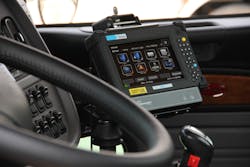Fine-tuning the future flow and protection of trucking data
Companies that specialize in developing transportation management systems (TMS) for motor carriers – technology also often called fleet managements systems (FMS) as well – say their future development focus is now not only upon improving the flow and analysis of trucking data, but boosting protective measures to defend against hacking attacks as well.
“More information delivered accurately allows a carrier to make faster decisions with a higher degree of accuracy,” Norman Thomas, VP-Operations for CarrierWeb, told Fleet Owner.
“Collaboration with customers and suppliers will always help a fleet to be better positioned to be successful and deliver what they expect,” he added. “Such clearly defined data – delivered in the proper format – will allow the carrier to show their customer they provide a higher value versus others that do not or cannot provide that type of information.”
Rick Ochsendorf, senior VP of operations at PeopleNet, noted that one example of the “evolution” now occurring with TMS technology is the ability to increase the accuracy of driver “scorecard” data.
“In the past companies used to score drivers based on fuel efficiency – but we know that fuel efficiency or miles per gallon data can be skewed based on numerous factors such as the terrain (mountains vs. flat), the age of a vehicle (older vehicles generally are less efficient), the weight of the load being carried, etc.,” he said.
“Instead, TMS can now accurately create scorecards based on shifting, braking, i.e. things the driver can control, by tying more deeply into engine and vehicle data,” Ochsendorf pointed out. “This methodology has proven to be a much more relevant and widely-accepted tool for measuring drivers based on performance.”
Yet with so much more data “in play” via TMS and FMS technologies, security is becoming a more prominent factor.
“Hacking, as we all know from recent headlines, is malicious and destructive at its core,” stressed CarrierWeb’s Thomas. “TMS technologies will be challenged to ensure accurate information and secure delivery of that information.”
He explained that on-board firewalls, restrictions placed on device usage, fire-walled server technology and constant vigilance upon those items has become a “normal part” of the information technology role within trucking in recent years and will continue going forward.
PeopleNet’s Ochsendorf provided a more specific look at how his company secures vehicle data communication and the related functions that support it:
- Vehicle Communication Security: “Vehicle-to-datacenter communications are configured and managed exclusively by PeopleNet so even the customer cannot manage or change these settings without working through us,” he said. All communications are encoded and compressed before being carried over PeopleNet’s proprietary communications protocol.”
- Data Storage Security: Data is stored in a secure farm of Microsoft SQL Servers. “These database servers are isolated from application servers behind a network DMZ, or demilitarized zone – a firewall configuration for securing local area networks (LANs),” Ochsendorf noted. “We follow industry best practices to protect against common intrusion attacks such as SQL injection, identity impersonation, etc. In addition, full backups are done weekly with transaction backups being done every 15 minutes and data is backed up to tape and taken offsite daily.
- User/Back Office Security: Authorized users are authenticated with a unique customer ID and password, with PeopleNet providing session encryption can be done via SSL or Site VPN. “For tracking purposes, sessions are locked to the IP [internet protocol] address they originated from for the duration of the session,” Ochsendorf added.
The upshot of such efforts, stressed Kim Drouillard, director of sales and Implementation at Sylectus, is to prevent any malicious use of TMS technology.
“Security is everybody’s concern when it comes to software design and implementation,” she added.
About the Author
Sean Kilcarr
Editor in Chief
Sean Kilcarr is a former longtime FleetOwner senior editor who wrote for the publication from 2000 to 2018. He served as editor-in-chief from 2017 to 2018.
